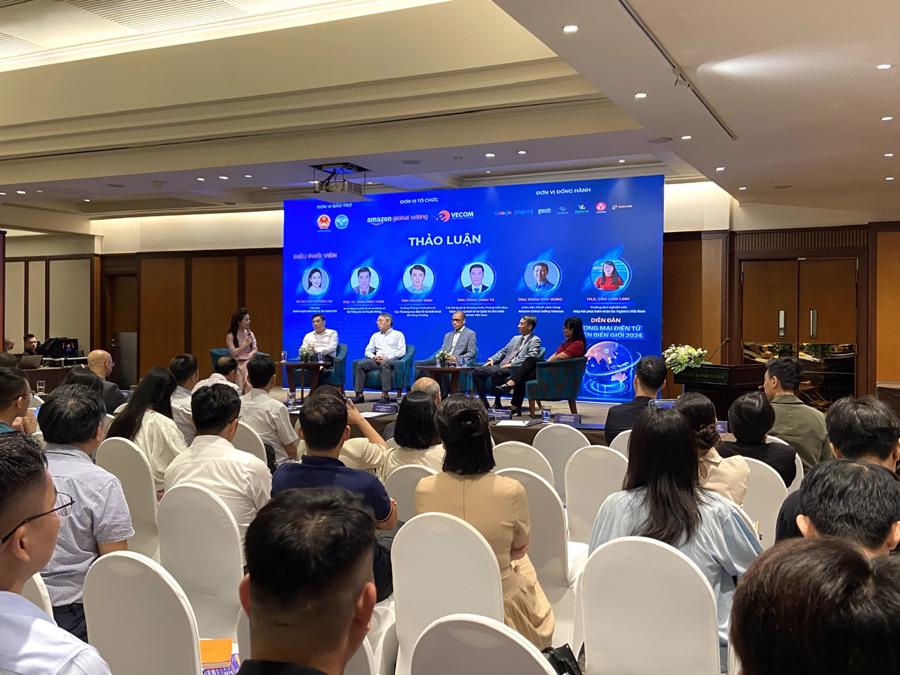At the 2024 Cross-Border E-Commerce Forum, organized by the Vietnam E-Commerce Association (VECOM) in collaboration with Amazon Global Selling, Mr. Hoang Ninh, Head of the Digital Government Office, Department of E-Commerce and Digital Economy, Ministry of Industry and Trade, shared that cross-border e-commerce is one of the four goals of the Master Plan for E-Commerce Development for the period 2026-2030.
LACK OF APPROPRIATE MECHANISMS
However, the development of cross-border e-commerce also poses challenges for Vietnamese small and medium-sized enterprises (SMEs). These include the challenge of promoting green and sustainable e-commerce. In addition, there is a shortage of skilled human resources in e-commerce, with only about 30% meeting the requirements.
Other issues include a lack of synchronization in e-commerce development, consumer trust, data security, and inadequate infrastructure.
Ms. Cao Cam Linh, representing the Vietnam Logistics Human Resources Development Association, shared a similar sentiment. She pointed out that for exports through e-commerce, Vietnam is still relying on international courier services for large shipments, rather than utilizing e-commerce in its true sense.
Similarly, the import of goods from foreign countries to Vietnam through cross-border e-commerce is non-existent. Therefore, Ms. Linh suggested that when formulating the e-commerce law, appropriate mechanisms and policies are necessary for the development of B2B and C2C models. Currently, the mechanism is primarily B2B, and it only becomes B2C when the goods reach the destination countries.
In light of these challenges, Mr. Ninh assured that the government and relevant ministries have implemented supportive policies for SMEs engaging in cross-border e-commerce. For instance, Decree 80/2021 offers a maximum of 50% financial support for creating and maintaining selling accounts on international e-commerce platforms for SMEs.
Additionally, the Ministry of Industry and Trade has conducted numerous training programs on e-commerce, with 15-20 classes per year, which are offered free of charge to businesses.
Furthermore, Associate Professor Dr. Tran Minh Tuan, Head of the Digital Economy and Digital Society Department, Ministry of Information and Communications, highlighted their efforts in promoting cross-border e-commerce. This includes ensuring postal infrastructure, digital infrastructure, telecommunications infrastructure, digital transformation, information security, and providing digital skills training for citizens. These policies are outlined in Decision No. 36/QD-TTg issued by the Prime Minister at the beginning of 2024, regarding the Planning of Vietnam’s Information and Communication Infrastructure for the period 2021-2030, with a vision towards 2050.
“To support SMEs in cross-border e-commerce, the Ministry of Information and Communications has collaborated with the Ministry of Industry and Trade to utilize a unified system for business assistance. In the third quarter of 2024, the two ministries will assess the level of digital transformation among SMEs and household businesses to understand their current standing,” shared Dr. Tuan.

Based on the assessment results, digital technology companies with competent capabilities will be invited to support businesses in terms of software and the utilization of digital platforms. Attractive incentives will be offered, such as free access to e-commerce platforms for 6 to 12 months, or direct engagement with ministries and local authorities to register for state support packages regarding consulting and the utilization of digital platforms.
SUPPORTING BUSINESSES IN PROTECTION AND BRAND BUILDING
For cross-border e-commerce to truly flourish in Vietnam, Mr. Trinh Khac Toan, Northern Region Director of Amazon Global Selling, recommended that managing agencies conduct in-depth studies to formulate policies that align with Decision No. 645/QD-TTg issued by the Prime Minister in 2020. This decision pertains to the planning of e-commerce development for the period 2021-2025 and should be approached from the following key directions.
Firstly, regarding human resource development, the goal is to have 70% of educational institutions offering e-commerce majors during the 2026-2030 period. Mr. Toan emphasized the critical importance of this target, noting that countries with a one to two-year head start in e-commerce development also heavily focused on training, particularly at the university level.
Secondly, there is a need for increased support from government agencies, organizations, and associations for businesses engaging in cross-border sales. This support should encompass protection and assistance in building their brands once they have established a presence in international markets. As these businesses are new to cross-border exports, they require more substantial backing from policy-making agencies to safeguard their position and sustain their exports in the global market.
Another point Mr. Toan raised was the need for specificity in the guidelines when the Ministry of Industry and Trade finalizes the E-Commerce Development Strategy for 2026-2030. He emphasized the importance of streamlining the process of developing decrees and circulars to concretize this strategy.
Particular attention should be given to guiding the development of logistics, ensuring that the logistics planning is closely linked to transportation infrastructure and aligned with the planning of production areas.
“Amazon’s research in markets such as South Korea, Japan, and China has revealed that their logistics systems, including warehouses and transportation networks, are strategically located near concentrated production areas. This proximity reduces transportation costs for goods moving from producers to importers and exporters,” shared Mr. Toan.
For businesses to succeed in cross-border e-commerce, Mr. Toan advised them to focus on understanding market demands and selling products that the market needs, rather than solely offering what they have. Simultaneously, they should continuously enhance the quality of their goods to meet not only customer expectations but also the quality standards of their target markets.
Lastly, a crucial formula for success is for businesses to concentrate on building their brands from the outset.
Driving Digital Transformation in the HR Industry
Thanks to technology, the labor management tasks, procedures, and administrative processes that used to be done manually will be significantly reduced.














